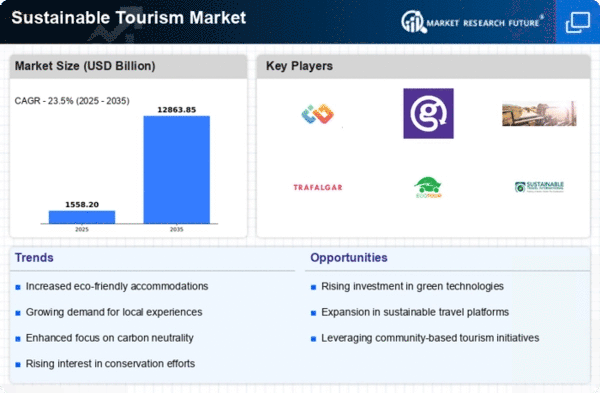Market Analysis
Sustainable Tourism Market (Global, 2024)
Introduction
The market for sustainable tourism is undergoing a fundamental transformation. Travellers are increasingly demanding sustainable and responsible travel. Awareness of the environment, combined with a desire to support local communities and safeguard cultural heritage, is reshaping the tourism industry. Governments, businesses and consumers are all becoming aware of the importance of sustainable tourism, and this is leading to the development of new products and services that reduce the impact on the environment and enhance the experience for travellers. The market for sustainable tourism is growing as the demand for sustainable tourism grows. This report analyses the key trends, challenges and opportunities in the sustainable tourism market, and examines the factors driving its evolution and the implications for the various stakeholders.
PESTLE Analysis
- Political
- In 2024, governments around the world are putting more emphasis on sustainable tourism. Over sixty countries have introduced laws reducing the carbon footprint of tourism. For example, the European Union has earmarked €1.5 billion to support sustainable tourism, with an emphasis on eco-friendly accommodation and the promotion of local cultures. The United Nations has set a target of re-directing at least 30% of all investments in tourism towards sustainable tourism by 2025.
- Economic
- In 2024 the sustainable tourism market will be worth $ 1tn. It is a result of the increased interest of consumers in eco-friendly travel. According to recent studies, seventy per cent of travellers are willing to pay up to 15 per cent more for sustainable accommodation and experiences. The sector will also create over one and a half million jobs, mainly in areas which focus on eco-tourism and community-based tourism initiatives, which will also boost the local economy.
- Social
- In 2024, 80 percent of tourists say that the environment is a major influence on their travel decisions. In 2027, the number of sustainable travelers exceeds 50 million. In the same year, the number of social media users who have been reached by the campaign for responsible tourism is 200 million. Travelers have developed a sustainable lifestyle and have shared their sustainable experiences.
- Technological
- A quarter of travelers already use the newest innovations to reduce their carbon footprint. Artificial intelligence is expected to bring personalization to travel, making it easier to choose sustainable options.
- Legal
- In 2024, several countries have imposed stricter regulations on tourism in order to encourage sustainable development. For example, the United States has introduced the Green Travel Act, which requires all federally funded tourism projects to meet the criteria of sustainable development. The Act affects an estimated $300 million in federal tourism funding. And the International Tourism Code of Conduct, affecting more than 1,000 tourism companies worldwide, ensures that they meet a series of social and environmental standards.
- Environmental
- The effects of tourism on the environment are coming under increasing scrutiny, with the industry responsible for about 8% of global greenhouse gas emissions in 2024. In response, many destinations are introducing measures to mitigate the impact, such as carbon-neutral certification for hotels and tour operators. Biodiversity conservation has also led to the creation of more than 200 new protected areas, covering more than a million square kilometres. These areas are intended to protect natural habitats and promote sustainable tourism practices.
Porter's Five Forces
- Threat of New Entrants
- “The market for sustainable tourism has swelled with new players, attracting interest from a wider audience.” But the high costs of complying with regulations and investing in eco-friendly practices may deter some potential investors. Also, established brands with a reputation for sustainability may create barriers for newcomers.
- Bargaining Power of Suppliers
- The suppliers of the sustainable tourism market, such as eco-friendly accommodation and local artisans, have moderate power. There are many suppliers, but those offering unique, high-quality, sustainable products can influence the price and availability, especially in niche markets.
- Bargaining Power of Buyers
- Consumers are increasingly aware of the importance of sustainable development and have a wide choice of products. They have considerable power to demand better services, lower prices and more sustainable practices, which forces companies to adapt.
- Threat of Substitutes
- The appeal of sustainable tourism can help to reduce this danger. As more and more people are attracted to sustainable tourism, there is a risk of competition from lower-cost alternatives that offer similar experiences.
- Competitive Rivalry
- “The market for sustainable tourism is becoming more and more competitive as more and more businesses realize the importance of sustainable development. The competition for the same customers is fierce, and this leads to a great deal of competition in terms of price, quality, and innovation in sustainable practices.
SWOT Analysis
Strengths
- Growing consumer awareness and demand for eco-friendly travel options.
- Support from governments and organizations promoting sustainable practices.
- Diverse offerings that cater to various demographics and preferences.
Weaknesses
- Higher costs associated with sustainable practices may deter some travelers.
- Limited availability of sustainable options in certain regions.
- Potential greenwashing by companies claiming sustainability without genuine practices.
Opportunities
- Expansion into emerging markets with increasing interest in sustainable tourism.
- Technological advancements enabling better tracking and reporting of sustainability efforts.
- Partnerships with local communities to enhance authentic travel experiences.
Threats
- Economic downturns leading to reduced discretionary spending on travel.
- Natural disasters and climate change impacting travel destinations.
- Increased competition from traditional tourism sectors adapting to sustainability trends.
Summary
The sustainable tourism market in 2024 will be characterized by strong demand and supportive policies, but will face challenges such as higher costs and the risk of greenwashing. Opportunities for growth will come from emerging markets and new technology. Economic uncertainty and climate change will pose a threat to the stability of the industry. Strategic focus on authentic collaborations and transparent practices will be essential for success.


















Leave a Comment